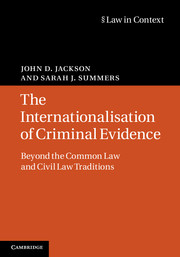Book contents
- Frontmatter
- Contents
- Foreword
- Preface and acknowledgements
- Abbreviations
- Table of international cases
- Part I Evidentiary contexts
- Part II Evidentiary rights
- 6 Fair trials and the use of improperly obtained evidence
- 7 The presumption of innocence
- 8 Silence and the privilege against self-incrimination
- 9 Defence participation
- 10 Challenging witness evidence
- 11 Towards a theory of evidentiary defence rights
- Index
- References
7 - The presumption of innocence
Published online by Cambridge University Press: 05 June 2012
- Frontmatter
- Contents
- Foreword
- Preface and acknowledgements
- Abbreviations
- Table of international cases
- Part I Evidentiary contexts
- Part II Evidentiary rights
- 6 Fair trials and the use of improperly obtained evidence
- 7 The presumption of innocence
- 8 Silence and the privilege against self-incrimination
- 9 Defence participation
- 10 Challenging witness evidence
- 11 Towards a theory of evidentiary defence rights
- Index
- References
Summary
Introduction
Although the maxim ‘presumption of innocence’ can be traced in common law history as far back as the days of Bracton and in continental history as far back as three centuries later, it is only in recent times that it has acquired considerable constitutional prominence. We have seen that it was enshrined in the Déclaration des droits de l'homme et du citoyen and in his study of human rights in national constitutions conducted some years ago Bassiouni found that it was contained in at least sixty-seven national constitutions across the common law and civil law world. The presumption of innocence has also been recognised in a wide range of international instruments such as the ICCPR, the ECHR, the ACHR and the African Charter on Human and Peoples’ Rights and by the international criminal tribunals and courts.
Before we examine how this principle has been applied across the two dominant legal traditions and by international human rights regimes, however, it will help our analysis if we are clear about what we mean by the presumption. Despite becoming so accepted, there is often a lack of clarity about what it means and we will argue that this can serve to obscure its central importance. As we shall see, it is commonly discussed exclusively within the context of a rule of evidence requiring a high standard of proof before conviction. But it is sometimes used in terms which make it almost synonymous with the right to a fair trial encompassing the fair trial standards we have discussed so far. In broader terms, it is also used to signify the right of individuals to be protected against coercive measures by the state or the right not to be convicted for crimes of which one is ‘morally’ innocent. In the first section we consider three rather different fields of application which can be viewed on a sliding scale from the particular to the general. We then go on to consider how the presumption has been regarded across the common law and civil law divide and by international human rights regimes.
- Type
- Chapter
- Information
- The Internationalisation of Criminal EvidenceBeyond the Common Law and Civil Law Traditions, pp. 199 - 240Publisher: Cambridge University PressPrint publication year: 2012
References
- 1
- Cited by

